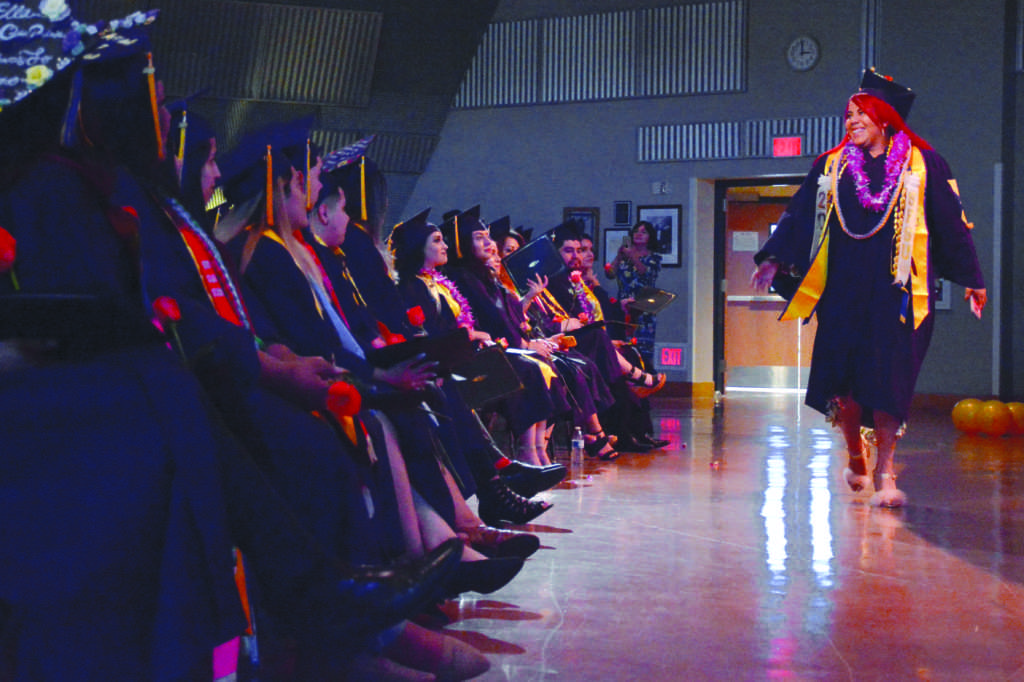Sandra Victoria Muniz Fernandez walks past her peers on her way to receive her diploma during the 5th annual Beyond Borders graduation ceremony that recognizes undocumented students on May 18, 2019. (TRISTEN ROWEAN/Golden Gate Xpress)
Now that the Dream Act of 2013 is six years old, undocumented students who have spent their college careers benefiting from its programs finally walked the stage May 19 at SF State’s Beyond Borders Graduation, publicly celebrating their achievement.
Since the first Beyond Borders Graduation five years ago, the number of undocumented graduates has nearly doubled.
Forty-three graduates planned to attend the 2019 ceremony, a striking increase from the 28 graduates whoattended Beyond Borders in 2018,
according to an email from Manuel Alejandro Pérez, Interim Assistant Vice President for Equity & Community Inclusion.
“While this number may not be fully representative of all undocumented graduating students,” Pérez said, “we know that this data is recent
and self-reported by our student community.”
Janet Lopez-Galindo, co-coordinator of Beyond Borders, said in past years the organization was concerned about advertising the event due to
potential anti-immigrant sentiments.
“I feel like with the year that has happened we have become more open … about the ceremony,” Lopez-Galindo said. “But I can’t say the political climate now is better now than it was back then.”
Lopez-Galindo said the celebration was centered around the theme of UndocuJoy, which seeks to shift media narratives of undocumented
people living in fear.
“We just want to incorporate the fact that we are like everyone else, every young person figuring out what they want to do in their lives, just
like every other graduate applying to grad school living their lives,” Lopez-Galindo said. “That’s us, we are a multifaceted people. And there is also so much joy in our lives regardless of our status, that its not something that always consumes us. ”
Sandra Muñiz Fernandez was among the graduates at the Beyond Borders ceremony celebrating her newly obtained criminal justice
degree.
Her road to graduation started in 2013 — just after the reintroduction of the Dream Act — and it wasn’t always easy, according to Muñiz
Fernandez.
“There were a lot of struggles actually, one of them being that the Dream Act resource was so fresh and so new,” Muñiz Fernandez said. “I
guess I was one of the first few guinea pigs and I didn’t know who to talk to.”
She said many of the financial aid counselors at SF State didn’t know how to work with an undocumented student. In 2015, navigating universi-
TV life became even more challenging when she experienced sexual abuse.
“I began doing like drugs, I guess you can say, and so my focus was not even [on] school anymore,” Muñiz Fernandez said. “It was just trying to
deal with or manage what happened to me in the fall of 2015, which left me failing school in 2016.”
University counselors told her she was unable to get financial aid and would have to drop out if she continued down the same rocky academic path. But then one counselor directed her to Norma Salcedo, AB 540 Dream Coordinator at the Dream Resource Center, who councils and advocates for the success of undocumented students.
“Norma checked my history,” Muñiz Fernandez said. “She actually sat down with me and went through my whole [plan for] classes and said
‘No you are just fine. Just try to pass the next semester.’”
Muñiz Fernandez said since then, the Dream Resource Center has become a place not only for Latinx Chicano, but Latinx undocumented students to feel comfortable and supported.
“Don’t feel alone. There is going to be resources everywhere, just look for them. Find an ally with a teacher. Even if its an instructor you have
barely met, if you feel a connection do it,” Muñiz Fernandez said. “A lot of students who are undocumented feel a little bit scared just because the whole Dream Act is still brand new … But Norma’s there to help you.”
Muñiz Fernandez dreams of becoming a lawyer, and plans to continue her education at Stanford or another law-school.







